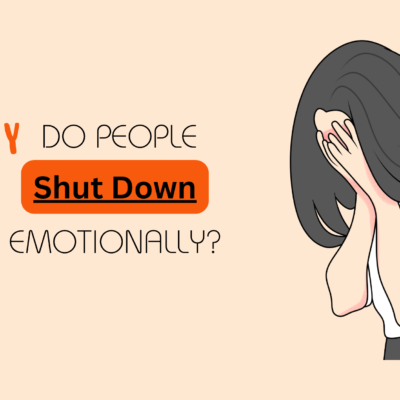Why Do People Shut Down Emotionally: Emotions are an essential part of the human experience which shape our perceptions, relations, and overall well-being. However, there are times when we find ourselves shutting down emotionally, withdrawing from our feelings, and distancing ourselves from others.
Above mentioned process known as emotional shutdown which can have deep effects on people and their relationships. In this article, we will talk about the reasons behind emotional shutdown and techniques for dealing with such emotions.
Also Read:
- My Job Is Too Stressful to Handle. What Can I Do?
- How to Clear Mind of Negative Thoughts?
- How to Stop Yourself From Overthinking at Night?
- Common Myths About OCD.
- How Do You Deal with Dissatisfaction in Life?
What is an Emotional Shutdown?
Emotional shutdown is the process whereby people disconnect from their emotions as a means of dealing with overwhelming stress, trauma, or emotional pain. Instead of facing and accepting their feelings, they choose to numb themselves, usually resulting in a sense of detachment.
Emotional shutdown can be seen in different forms, including avoidance of emotional discussions, withdrawal from social interactions, and a general sense of emotional numbness.
A few factors that contribute to emotional shutdown:
Trauma and Past Experiences
People who have experienced trauma, whether physical, emotional, or psychological, may resort to emotional shutdown as a protection tool. Traumatic events can overwhelm our capacity to deal with our emotions, leading them to shut down as a way to save themselves from further harm.
Chronic Stress
Long exposure to stressors such as work pressure, financial difficulties, or relationship problems can drain one’s emotional resources, making it difficult to engage with their feelings. In such cases, emotional shutdown may act as a temporary getaway from the overwhelming stressors.
Unresolved Emotions
Sometimes, people may shut down emotionally due to unresolved emotional issues from the past. Whether it’s unresolved grief, resentment, or guilt, facing these emotions can be daunting, prompting people to shut down instead of facing them.
Fear of Vulnerability
Opening up emotionally demands vulnerability, which can be scary for some people. Fear of rejection, judgment, or being hurt may cause people to shut down their emotions to protect themselves from possible harm.
Cultural and Societal Norms
Cultural and societal norms can also affect how we express and deal with our emotions. In societies that value patience and emotional control, people may learn to suppress their feelings which can lead to emotional shutdown as a regular response.
Effects of Emotional Shutdown
Emotional shutdown can have harmful effects on both people and their relationships:
Less Emotional Connection
When you shut down emotionally, you become disconnected from your feelings, making it difficult for them to empathize with others. This lack of emotional connection can weaken relationships and lead to feelings of isolation and loneliness.
Communication Barriers
Emotional shutdowns usually hamper effective communication, as people may struggle to express their thoughts and feelings openly. This can result in misunderstandings, conflict, and a breakdown of trust within relationships.
Mental Health Issues
Continuous emotional shutdown can add negatively to mental health issues such as depression, anxiety, and post-traumatic stress disorder (PTSD). Suppressing emotions can worsen underlying psychological distress and lead to emotional suffering.
Physical Health Effects
Chronic emotional suppression has been linked to different physical health effects, such as increased risk of cardiovascular disease, weakened immune function, and higher levels of inflammation in the body.
Effect on Self-Identity
Emotional shutdown can misinterpret one’s sense of self-identity, leading to feelings of emptiness and disconnection. People may struggle to understand their own emotions and may not be able to stay their authentic selves.
Techniques for Dealing with Emotional Shutdown
Self-Awareness
The first step in overcoming emotional shutdown is creating self-awareness. You first need to recognize when you are shutting down emotionally and explore the underlying reasons behind your behavior. Journaling, therapy, and mindfulness practices can help you gain insight into your emotions and thought patterns.
Emotional Expression
Finding healthy platforms for emotional expression is important for breaking through emotional shutdown. This could include talking to a trusted friend or therapist, engaging in creative activities such as art or music, or practicing mindfulness and meditation to connect with one’s emotions.
Setting Boundaries
Learning to set boundaries and prioritize self-care is important for handling emotional overwhelm. People should identify their limits and communicate them assertively to others. Say not to others when it is necessary and prioritizing activities that encourage emotional well-being can help prevent you from burnout and emotional shutdown.
Seeking Support
If you are experiencing emotional shutdown it is important to seek support from friends, family, or mental health professionals. Therapy, support groups, and counseling can give a safe space for people to explore their emotions, heal from past trauma, and learn healthy coping mechanisms.
Developing Empathy
Practicing empathy towards oneself and others can help people break down emotional barriers and encourage deeper connections. By acknowledging and validating your own emotions, you can develop compassion and understanding for others’ experiences, maintaining interpersonal relationships.
At The End
Emotional shutdown is a complicated phenomenon affected by different factors, including past experiences, chronic stress, and societal norms. While shutting down emotionally may provide temporary relief from the burden of emotions, it can have long-term effects on people’s mental, emotional, and physical well-being.
But by following the above-mentioned ideas you can learn to handle emotional shutdown and develop greater emotional stability and genuineness in your lives.








